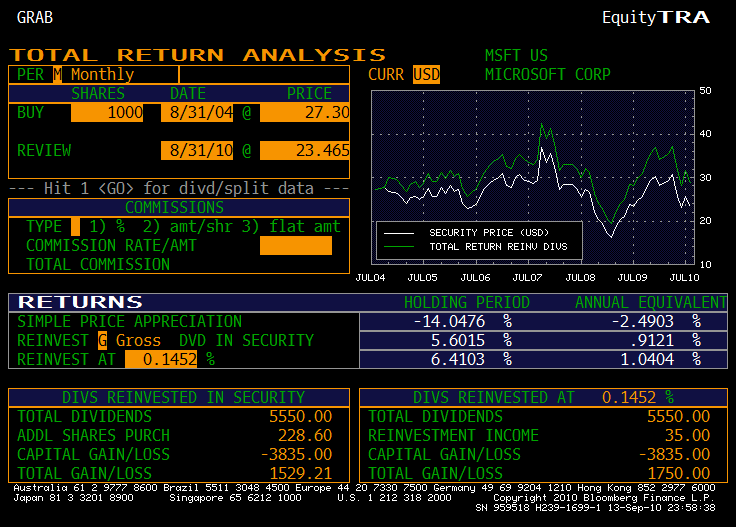When Microsoft decided to do its special dividend in 2004, I was interviewed by TheStreet.com.? I commented here:
In addition, the stock may avoid falling a full $3 because many investors believe the cash is better in their wallet and not in Microsoft’s. “Some people might say, ‘Well, good, that means Microsoft can’t waste the money on an acquisition that might not be so good,'” said David Merkel, a senior investment analyst with Hovde Capital and columnist for RealMoney.com. “So it might actually make Microsoft’s stock price go up a little bit.” (Merkel’s firm does not hold Microsoft shares.)
“Cash is worth more in my hand [than the company’s hands] almost always,” Merkel added.
And then at the same time here:
“In a case like Microsoft, where management has committed to returning cash to shareholders, you can value that cash at face value,” said David Merkel, a senior analyst with Hovde Capital and columnist for RealMoney.com. He believes the only time to deduct a company’s cash on a dollar-for-dollar basis is when there is a definite liquidity event, such as Microsoft’s special dividend, that truly gives investors control of the cash.
In the early 1980s, cash had that dollar-for-dollar value because so many corporate raiders were putting the cash on their balance sheets for use in buying other companies.
But in today’s world, a more likely use of cash might be buying back stock — a step Microsoft is taking in addition to its special dividend. But announcing a buyback plan is no guarantee a company will buy the shares, Merkel noted. Hence, he would only deduct 90 cents for every $1 of cash from a stock’s price to value a stock because of uncertainty as to whether management will use that cash as it says.
Another situation in which you might not give a company full credit for its cash is if you don’t fully trust management, perhaps because it has a bad track record with acquisitions or expanding into new markets, Merkel said.
My view was that Microsoft was a mature business that needed to return cash to its shareholders.? The more, the better; cash in the hands of management was leading to poor acquisitions and overpriced buybacks.
Now consider the returns on MSFT stock from August 2004 through August 2010:
Less than 1%/year does not make it, particularly when the stock is basically a wasting trust.? I don’t have interest in the company, because they have consistently bought back shares at high prices — near $34/share over the last four years, considering issuance to employees.
Also, Microsoft may look cheap on an earnings basis after deducting cash, but much of the cash is not free to be dividended.? Microsoft would have to pay taxes to repatriate the money.? (Can’t they find a clever transfer-pricing accountant?)? Why pay more than six times tangible book for a company that is not growing its earnings rapidly, and misuses its free cash on buybacks and acquisitions?
So when I hear that Microsoft will borrow money to fund dividends and a buyback, I say, “Why pay money for financial engineering?? Better you should look for genuine organic growth.”? There is nothing good to be found in Microsoft, look elsewhere for value among tech companies.


2 thoughts on “Micro + Soft = Small + Squishy”
Comments are closed.